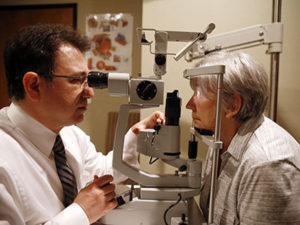Guidelines to Ensure Eye Surgery Success

Dr. Abrams make sure his patients are prepped for all eye surgery procedures
We recently covered some of the questions that you should ask your eye surgeon while having a consultation before you have eye surgery. This includes prep for surgical procedures such as Laser LASIK, Laser cataract surgery and INTACS to name a few.
Should you and your eye surgeon decide that surgery is your best option, the process then turns to preparation for your procedure.
While every procedure, and every set of eyes, is different, Dr. Jack Abrams and his staff at Abrams Eye Institute share a few recommendations to make sure your best set up for success in advance – and immediately after – your surgery. We recommend that you print this material out and review it closely.
Give Your Eyes a Rest: If you’re getting ready for a procedure like Laser LASIK, it’s advisable to put your contact lenses away (if you wear them) and switch to wearing your glasses for a week or so before your surgery. Contacts can cause your cornea to alter in shape, and not wearing the lenses gives your eyes, and your cornea, time to adjust. Dr. Abrams and his team will provide more specific guidelines, depending on your eyes.
Keep Your Eyes Clean: It’s recommended to refrain from using eye makeup, eye creams and anything else you may regularly use for your eyes for a few days before, and after, your procedure. Depending on your procedure, you may need also to clean your eyelashes to remove debris that can cause irritation and potential infections.
Stop Taking Medicine(s): You may be advised to stop taking certain medicines that can cause issues during surgery, such as excess bleeding. Make sure you know all of the medications you currently use before your procedure, and ask Dr. Abrams what medicines should be avoided in the time up to, and after, your procedure.
Monitor Your Diet: You may be advised to fast for 12 hours before your procedure, depending on what eye surgery you’ll be having done. This fasting keeps your stomach empty and can prevent problems during the procedure. for some surgeries you may not need to fast, but you may want to consider what you do eat and/or drink to ensure proper comfort during the procedure.
Bring a Friend: No matter how minor your procedure may be, or what you’ve heard from anyone else having the same procedure as you, you shouldn’t drive yourself home after your eye surgery. Even if you live a very short distance from where the surgery will be done, have a family member or friend accompany you so you’ll have a safe ride home.
Take it Easy: Plan on not being active for a few days after your procedure. Being overly active can cause elevated blood pressure, which can put stress on your eyes. Changes made to your eyes from surgery can be quite delicate, and it’s a good idea to give your eyes some time to heal without being stressed by activity.
To restate, everyone’s eyes and surgery are unique and we urge you to ask as many questions as you can before your surgery. Dr. Jack Abrams and the team at Abrams Eye Institute are always available to answer any question you have, while setting you up for a successful surgery. You can call the clinic at 702-304-9494, or send us a question via our on-site web form.

